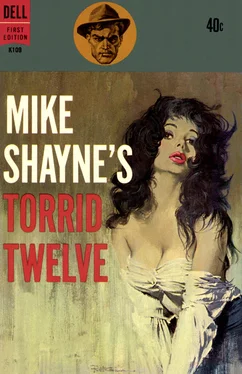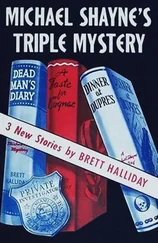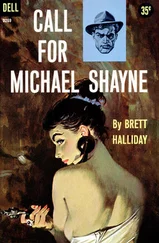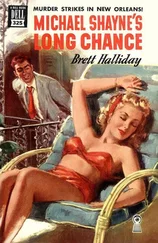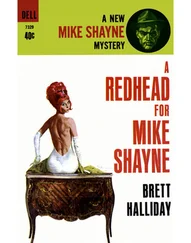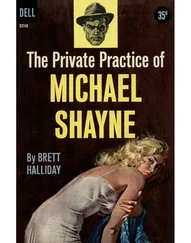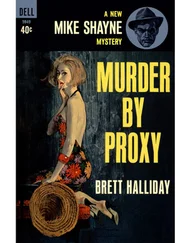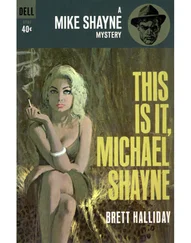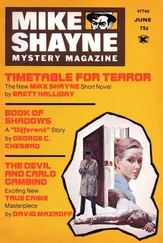Brett Halliday - Mike Shayne's Torrid Twelve
Здесь есть возможность читать онлайн «Brett Halliday - Mike Shayne's Torrid Twelve» весь текст электронной книги совершенно бесплатно (целиком полную версию без сокращений). В некоторых случаях можно слушать аудио, скачать через торрент в формате fb2 и присутствует краткое содержание. Город: New York, Год выпуска: 1961, Издательство: Dell Publishing, Жанр: Детектив, на английском языке. Описание произведения, (предисловие) а так же отзывы посетителей доступны на портале библиотеки ЛибКат.
- Название:Mike Shayne's Torrid Twelve
- Автор:
- Издательство:Dell Publishing
- Жанр:
- Год:1961
- Город:New York
- ISBN:нет данных
- Рейтинг книги:3 / 5. Голосов: 1
-
Избранное:Добавить в избранное
- Отзывы:
-
Ваша оценка:
- 60
- 1
- 2
- 3
- 4
- 5
Mike Shayne's Torrid Twelve: краткое содержание, описание и аннотация
Предлагаем к чтению аннотацию, описание, краткое содержание или предисловие (зависит от того, что написал сам автор книги «Mike Shayne's Torrid Twelve»). Если вы не нашли необходимую информацию о книге — напишите в комментариях, мы постараемся отыскать её.
Mike Shayne's Torrid Twelve — читать онлайн бесплатно полную книгу (весь текст) целиком
Ниже представлен текст книги, разбитый по страницам. Система сохранения места последней прочитанной страницы, позволяет с удобством читать онлайн бесплатно книгу «Mike Shayne's Torrid Twelve», без необходимости каждый раз заново искать на чём Вы остановились. Поставьте закладку, и сможете в любой момент перейти на страницу, на которой закончили чтение.
Интервал:
Закладка:
Local newspapers, the next day, carried three-and four-paragraph stories on inside pages about the apparently impulsive, macabre suicide of Mrs. Robert D. Brown. There were pictures of the twenty-eight-year-old Bernice. One caption read: Beauty Drinks Death Cocktail. Stories mentioned Mr. Brown, who had not been at home, as a salesman traveling for Glamor-Glo Cosmetics.
Bernice had two older sisters, one of them married. These, with the brother-in-law, helped Brown with the few arrangements that had to be made. The brother-in-law confided in Brown, and Lieutenant Storber.
“To tell you the truth, I’m not surprised. Bernice was always moody and different. Most people wouldn’t notice, but there were little things gave her away, to anyone who had his eyes open.”
She was buried on the third day, at a quiet service. Brown came back to the apartment afterward, but there was nothing for him to do. He made arrangements to have the furniture stored and to terminate his lease. Then he packed his personal suitcase. It was the third day. He was due in Hartford that evening, at seven o’clock. Lucille would be expecting him — as Raymond A. Brown, salesman for a firm that manufactured smokers’ accessories.
Brown felt better after the change-over. Lucille might have her faults, but, tactfully handled and ignoring her sudden outbursts of temper, she could also be a wonderful tonic for the nerves. Bruised and shaken as his were, after the last three days, he needed an influence that would restore his normal poise and self-confidence.
Therefore it was strange, and more than frightening, when he arrived at his modest, two-story Hartford home that evening, to find a police prowl-car parked in front of it, along with others whose official look he knew too well. The newly familiar scene was only too familiar.
He felt that this was a motion picture he had seen before. He hadn’t liked it the first time, but now he was plunged, in a single moment, from uneasy disbelief to numb horror. This couldn’t be happening — not again — not to him. But it was happening. It didn’t help, for some reason it was only worse, much worse, that this time he knew all the lines by heart, including his own.
“Mr. Brown?”
“Yes. What’s the matter?”
“I’m afraid I have bad news for you, Mr. Brown. It’s your wife. I’m Lieutenant-Detective Todd. Your wife is dead.”
“Lucille? Dead? She can’t be. It’s impossible. It’s silly. This whole thing is silly. What happened?”
“Did your wife have any reason for taking her own life, Mr. Brown?”
“Lucille kill herself? No —absolutely not. That’s out of the question.” Brown’s repudiation, this time, came from more than spontaneous grief. There was black suspicion behind it. “There’s no chance she committed suicide, Lieutenant. None!”
The lieutenant’s sympathy was partly habit, but he showed a trace of real curiosity, as well. “Why do you say that, Mr. Brown? How can you be so sure?”
Brown opened his mouth to tell him why. It could not be coincidence that two of his wives, unknown to each other, had died by their own hands within a matter of days. But he checked himself in time. The mere existence of his surplus marriages, if exposed, spelled ruin.
“It wouldn’t be like her,” he said lamely. Then he collected his shattered wits and marshaled the solid facts of his alibi.
They were good enough for Lieutenant-Detective Todd. The widower had been having lunch in a quiet restaurant, fifty miles away, at the hour Lucille drank a cocktail, an old-fashioned this time, loaded with cyanide. She had been alone in the house, in the downstairs bar. The bottle of liquor used in the drink also held cyanide.
An old, dusty tin of the substance had been found among the hand-wrought bracelets, brooches and costume novelties in which Lucille dabbled, as a hobby. Again, there was no note. But Lieutenant Todd told Brown that this happened more often than most people thought.
Three days later, the same iron-clad story satisfied Detective-Inspector Casey of the Boston police, who was inquiring into the bizarre suicide of Mrs. Reynold B. Brown, housewife, of that city. Though hard-boiled, Casey and his fellow-officers were deeply touched by the protests of the bereaved husband that Helen couldn’t, wouldn’t and didn’t knowingly drink that deadly old-fashioned. Again! Their investigation would be thorough, but did Brown have any cold facts to support his refusal to accept suicide as the obvious conclusion? Anything at all except his intuition?
Brown did, indeed, have one overwhelming fact, but he was not in any position to offer it. Some unknown party or parties had a profound grudge against him and his wives, and was methodically carrying it to the extreme limit. But who? Of more immediate importance, who would be next?
The answer to the last question was simplicity itself. When they buried Helen, and Brown tried to pull his tangled thoughts together, he was at least able to perform a problem in elementary arithmetic — subtraction, unfortunately. By ruthless annulment — he hated to call it murder, in an affair so personal — he had only one wife left, Marion, in Camden.
As to the method used in breaking up his happy homes, Brown had little doubt. Some inconspicuous person, a casual friend, even a complete stranger with some plausible tale, had in each case called upon the victim when she was alone. At some point, the hostess would suggest cocktails, and, when she had poured them, her attention must have been diverted long enough, or, perhaps, she had been decoyed from the room, while the fatal drink was prepared.
After that, it was easy. Thoroughly wash, then replace the second cocktail glass. Put some more cyanide in the already open bottle, then unobtrusively depart. To the police, each case was no mystery, because it stood alone. Only Brown knew there were three, that they were linked and what the link was. Only Brown and — a murderer.
But who had such a fanatical resentment against Brown, the happy home-builder, and his uncomplaining wives? It occurred to him that he might somehow have come to the notice of an avenging misogynist. Some crank who hated not only women but marriage, especially wholesale marriage. That, he thought, might well be it. Brown, personally, had few close friends. He had, as far as he knew, no enemies.
After Boston, his regular schedule called for a restful, relaxing two-day trip back to Camden and now, in spite of serious misgivings, he set out for the city on the Delaware. He was worried about Marion, among a lot of other problems. He had forgotten to phone her, immersed as he was in so many tragic details. He wondered if he should call her now, with a peremptory warning not to drink any cocktails with anybody, no matter who?
He decided against it. For one thing, Marion never drank cocktails. He had never known her to drink anything alcoholic, not even beer, and she ought to be invulnerable to the only technique the killer seemed to know.
For another thing, if he did phone, any strange injunctions of that sort would be awfully, awfully hard to explain.
4
At seven o’clock on the evening of the sixteenth, the day and the hour he was expected, Brown rolled to a stop at the curb before his house in Camden. It was with relief that he found room to do so. The street was curiously empty of police and other too-familiar official vehicles. Marion met and greeted him at the front door, just as he reached it.
“Richard, darling!” she said, with warmth.
Even as they kissed, he spoke without thinking, from habit. “Yes. What’s the matter?”
“Nothing — why should there be? Did you have a nice trip?”
Brown recollected himself almost with a start. He shook his head and, at the same time, nodded, achieving a circular motion that might mean a lot, but was intended to signify nothing. He went on into the living room and, for a moment, stood in the middle of it, looking around. It, too, seemed rather empty, unpopulated as it was by hard-eyed but sympathetic detectives.
Читать дальшеИнтервал:
Закладка:
Похожие книги на «Mike Shayne's Torrid Twelve»
Представляем Вашему вниманию похожие книги на «Mike Shayne's Torrid Twelve» списком для выбора. Мы отобрали схожую по названию и смыслу литературу в надежде предоставить читателям больше вариантов отыскать новые, интересные, ещё непрочитанные произведения.
Обсуждение, отзывы о книге «Mike Shayne's Torrid Twelve» и просто собственные мнения читателей. Оставьте ваши комментарии, напишите, что Вы думаете о произведении, его смысле или главных героях. Укажите что конкретно понравилось, а что нет, и почему Вы так считаете.
